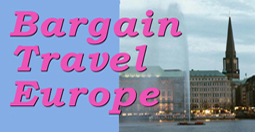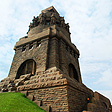TRADITIONAL COFFEE HOUSES OF LEIPZIG
Table for Schumann Party
 The evidence that the citizens of Leipzig in the eastern German region of Saxony are affectionately known as the "Kaffeesachsen" (Coffee-drinkers of Saxony) tells you all you need to know about the local fondness for the dark brew of the Arabaca bean. Coffee houses of one form or another can now be found on street corners and malls in almost any cosmopolitan city across the western world, but it was not always so. Leipzig’s love affair with the beverage goes as far back as 1695, when coffee shops began to spread in this city of trade fairs, when they became popular meeting places. Today, the tradition is preserved in a several historical cafés in the city center which have not changed much in a few hundred years, and the tradition has been revived by the establishment of new coffee houses. The most famous names include the Zum Arabischen Coffe Baum and Kaffeehaus Riquet, the Café Corso and Café Kandler.
The evidence that the citizens of Leipzig in the eastern German region of Saxony are affectionately known as the "Kaffeesachsen" (Coffee-drinkers of Saxony) tells you all you need to know about the local fondness for the dark brew of the Arabaca bean. Coffee houses of one form or another can now be found on street corners and malls in almost any cosmopolitan city across the western world, but it was not always so. Leipzig’s love affair with the beverage goes as far back as 1695, when coffee shops began to spread in this city of trade fairs, when they became popular meeting places. Today, the tradition is preserved in a several historical cafés in the city center which have not changed much in a few hundred years, and the tradition has been revived by the establishment of new coffee houses. The most famous names include the Zum Arabischen Coffe Baum and Kaffeehaus Riquet, the Café Corso and Café Kandler.
Coffe Baum
 The "Coffe Baum" is one of the oldest coffee shops in Europe to survive in its original form, still a quaint and intimate shop just a few steps from the city’s historic musical path to the Bach House. In 1717, Johann Lehmann purchased some premises in the Fleischergasse, which he converted into a coffee house. One year after his death in1720 it was opened by his widow as "Zum Arabischen Coffe Baum". The third floor now houses a coffee museum with one of the most important collections in the world. There are 15 rooms with over 500 specially selected exhibits dating from Saxony's 300-year history of coffee and culture. The artifacts include tabletop roasters and coffee mills from various eras and a very modern sample roaster. The sandstone sculptural design above the doorway is a famous feature of the building, depicting an Ottoman Turk with a large pot of coffee, passing a cup to Eros, symbolizing the meeting of the Christian West and the Muslim East.
The "Coffe Baum" is one of the oldest coffee shops in Europe to survive in its original form, still a quaint and intimate shop just a few steps from the city’s historic musical path to the Bach House. In 1717, Johann Lehmann purchased some premises in the Fleischergasse, which he converted into a coffee house. One year after his death in1720 it was opened by his widow as "Zum Arabischen Coffe Baum". The third floor now houses a coffee museum with one of the most important collections in the world. There are 15 rooms with over 500 specially selected exhibits dating from Saxony's 300-year history of coffee and culture. The artifacts include tabletop roasters and coffee mills from various eras and a very modern sample roaster. The sandstone sculptural design above the doorway is a famous feature of the building, depicting an Ottoman Turk with a large pot of coffee, passing a cup to Eros, symbolizing the meeting of the Christian West and the Muslim East.
Kaffeehaus Riquet
 The Kaffeehaus Riquet is a different affair entirely, less intimate, more in the Viennese tradition and an architectural gem of the Art Nouveau age. The Riquet history of trade with the Middle and Far East dates from 1745, but in 1908 when architect Paul Lange designed the company’s signature coffee house in Leipzig, he incorporated the flavors of the orient into his design of the café. The building became one of the most original buildings in the city at the time, featuring a curious mix of two pagoda towers on the roof in Chinese style, with the balustrades, cornices and gables decorated with beautifully Art Nouveau mosaics. The iconic café entrance is flanked by the symbols of the Riquet & Company trademark of two elephant heads wrought in copper.
The Kaffeehaus Riquet is a different affair entirely, less intimate, more in the Viennese tradition and an architectural gem of the Art Nouveau age. The Riquet history of trade with the Middle and Far East dates from 1745, but in 1908 when architect Paul Lange designed the company’s signature coffee house in Leipzig, he incorporated the flavors of the orient into his design of the café. The building became one of the most original buildings in the city at the time, featuring a curious mix of two pagoda towers on the roof in Chinese style, with the balustrades, cornices and gables decorated with beautifully Art Nouveau mosaics. The iconic café entrance is flanked by the symbols of the Riquet & Company trademark of two elephant heads wrought in copper.
Café Corso
The Café Corso has been a Leipzig patisserie tradition since 1912. This coffee shop had been a family business for half a century before the changes of cold war era politics, but with the reunifaction of the country in 1989 the Fisher Family was able to recapture their history and bring the company back to family ownership, and is now a tradition of 100 years. All the Corso's bakery products are hand made for discerning tastes. The shop prides itself on its Christmas stollen and a slection of traditional Yuletide biscuits. It also one of the few remaining patisseries in Germany where Baumkuchen is still made only by hand.
Café Kandler
The Café Kandler also returned to private hands in 1989, recovering its long city tradition of offering discerning guests it special blend style and Leipzig coffee house charm. There are a number of Kandler cafés now. The original traditional coffee house, is a few steps from the churches of St Thomas and St Nicholas in the old city center, while two more are at Pier 1 of the Zörbiger Marina on Lake Cospuden, and at the Leipzig Zoo. © Bargain Travel EuropeFind best hotel and vacation deals in Leipzig on TripAdvisor
These articles are copyrighted and the sole property of Bargain Travel Europe and WLPV, LLC. and may not be copied or reprinted without permission.
See Also:
MENDELSSOHN HOUSE – LEIPZIG
AUERBACHS KELLER - GOETHE INSPIRATION
BRUSSELS MUSICAL INSTRUMENT MUSEUM

